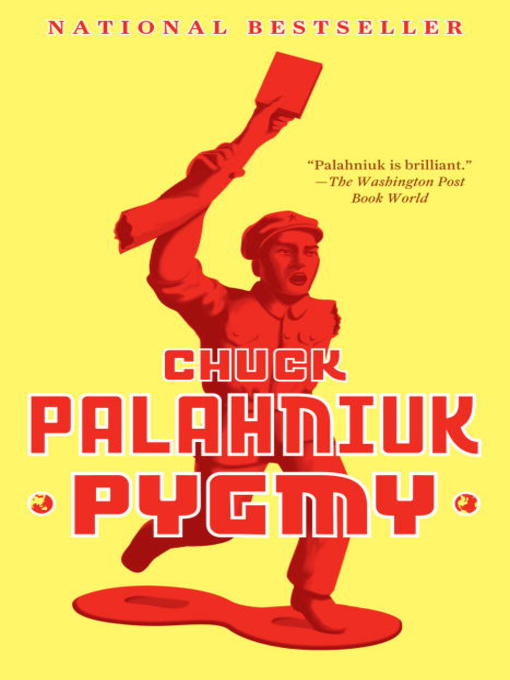
Pygmy
کتاب های مرتبط
- اطلاعات
- نقد و بررسی
- دیدگاه کاربران
نقد و بررسی

March 2, 2009
Palahniuk’s 10th novel (after Snuff
) is a potent if cartoonish cultural satire that succeeds despite its stridently confounding prose. A gang of adolescent terrorists trained by an unspecified totalitarian state (the boys and girls are guided by quotations attributed to Marx, Hitler, Augusto Pinochet, Idi Amin, etc.) infiltrate America as foreign exchange students. Their mission: to bring the nation to its knees through Operation Havoc, an act of mass destruction disguised as a science project. Narrated by skinny 13-year-old Pgymy, the propulsive plot deconstructs American fixtures, among them church (“religion propaganda distribution outlet”), spelling bees (“forced battle to list English alphabet letters”) and TV news reporters (“Horde scavenger feast at overflowing anus of world history”), before moving on to a Columbine-like shooting spree by a closeted kid who has fallen in love with the teenage terrorist who raped him in a shopping mall bathroom. Decoding Palahniuk’s characteristically scathing observations is a challenge, as Pygmy’s narrative voice is unbound by rules of grammar or structure (a typical sentence: “Host father mount altar so stance beside bin empty of water”), but perseverance is its own perverse reward in this singular, comic accomplishment.

March 12, 2009
A series of dispatches written in fractured and occasionally hilarious English suck readers into the mind of exchange student and would-be terrorist Pygmy.
In this wildly experimental text, Palahniuk (Snuff, 2008, etc.) creates such a compelling character in Pygmy that we accept the boy's biases and epithets as completely appropriate. He arrives in the United States with a strong accent and a strong distaste for everything American, including his host family:"vast cow father, pig dog brother, chicken mother, and cat sister." While planning his rather murky act of terrorism ("Code Name: Operation Havoc"), Pygmy begins to accommodate himself to American life, especially high school. Along with other"social losers," he represents the United States in a model UN conference, unaccountably wins a spelling bee and takes part in a science fair during which the plants in a competing hydroponics garden are exposed as marijuana. ("Sabotage successful," he writes.) Trying, like many of us, to make sense of contemporary American life, Pygmy fails because so much of popular culture is short on logic and meaning. His take on what the customs agent assures him is"the greatest country on earth"?"Snake nest. American den of evil. Hive of corruption." His perception of the educational system?"Primary function introduce partners for reproduction." His take on a girl at a school dance?"Specimen female, permit perform mating dance prior generate human embryo?" Pygmy loves to quote leaders he admires, such as Adolf Hitler:"It is not truth that matters, but victory." And while his machinations eventually destroy his American family, not even the disclosure that Pygmy is a terrorist can get much of a rise out of his host sister, who has the typical adolescent reaction:"Whatever."
Stylistically exhilarating but not for every taste.
(COPYRIGHT (2009) KIRKUS REVIEWS/NIELSEN BUSINESS MEDIA, INC. ALL RIGHTS RESERVED.)

Starred review from March 1, 2009
In a time of justifiable concern about terrorism, Palahniuk has written a hilarious novel about an unlikely terrorist cell: foreign-exchange students who arrive at a midwestern city, bent on unleashing Operation Havoc. The story unfolds in a series of dispatches from an unnamed 13-year-old agent, dubbed Pygmy by the locals. (That his reports are in broken English makes no sense, but the prose provides terrific opportunities for humor even if, at book length, it requires some effort.) Despite Pygmys command of the deadly arts, he is still a 13-year-old, prone to unwanted erections, and he is not the coolest kid in the cadre, either. The frisson around his internal, target-acquiring narrative, the locals unwitting perception of him, and his outsiders view of the routine humiliations inflicted upon high-school youth is so spot-on it produces a sense of d'j vu: surely someone would have thought of this before. (Dispatch Sixth, treatingJunior Swing Choir, is laugh-out-loud funny.) This isnt for everyone: as ever, Palahniuk is interested in pushing the limits of what readers will tolerate in terms of clinically described sex and gore. However, in contrasting the mindless sloganeering of totalitarianism with the anything-goes nature of Americanism, his own message is anything but subversive. By now, the authors fans know who they are. Those left cold by last years Snuff (2008) will welcome his return to the fine form of Fight Club (1996). Palahniuk leaps over the line of good tasteand lands squarely on his feet.(Reprinted with permission of Booklist, copyright 2009, American Library Association.)

























دیدگاه کاربران